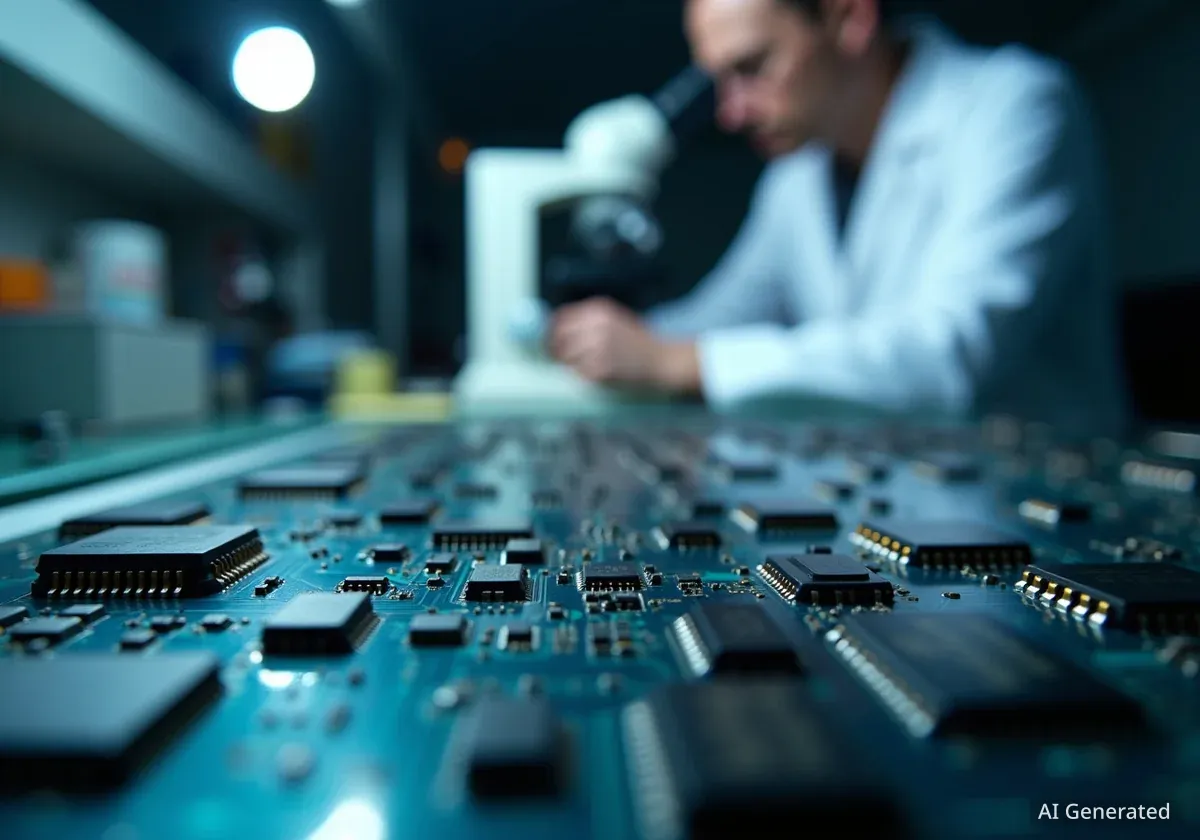An analysis of Huawei Technologies' advanced Ascend 910C artificial intelligence processors has revealed the presence of components manufactured by Samsung, SK hynix, and Taiwan Semiconductor Manufacturing Company (TSMC). The discovery, made by research firm TechInsights, indicates that Huawei has been utilizing a stockpile of parts acquired before U.S. export restrictions were fully implemented.
Key Takeaways
- A teardown of Huawei's Ascend 910C AI chip identified processor dies made by TSMC.
- The chip also contains older-generation high-bandwidth memory (HBM2E) from Samsung and SK hynix.
- All three suppliers state they have complied with U.S. export controls and ceased business with Huawei in 2020.
- Analysts believe the components originate from a substantial inventory stockpiled by Huawei before the sanctions took effect.
Analysis Reveals Foreign Components in Advanced Chip
A recent investigation by the firm TechInsights examined several samples of Huawei’s third-generation Ascend 910C AI accelerator. The analysis confirmed that the processor dies, the core functional units of the chip, were manufactured by TSMC.
In addition to the TSMC-made dies, the researchers found high-bandwidth memory, a critical component for AI processing. Specifically, an older type known as HBM2E was identified. Components from South Korean firms Samsung Electronics and SK hynix were found in different samples of the same Ascend 910C chip.
The Ascend 910C is a key part of Huawei's strategy to compete in the AI hardware market, particularly as access to chips from companies like Nvidia has been restricted in China. The 910C is reportedly constructed by packaging two of Huawei's previous-generation 910B dies together, a technique used to increase performance without access to the latest manufacturing processes.
Background on U.S. Restrictions
Starting in 2019, the United States government implemented a series of export controls and restrictions against Huawei. These measures were designed to limit the company's access to advanced semiconductor manufacturing technology and components, citing national security concerns. The restrictions effectively cut off Huawei from new supplies from major global chipmakers like TSMC.
Suppliers Reaffirm Compliance with Export Controls
In response to the findings, all three companies implicated have reiterated their commitment to complying with U.S. regulations. They stated that they have not supplied Huawei with components since the restrictions were enacted in 2020.
TSMC provided a statement clarifying its position. "We are looking into this report," the company noted. "It appears that the product in question is made by packaging together two of the dies that were analyzed by this organization in October of 2024, and not with more recently manufactured die or more advanced technology."
TSMC also added, "Shipments and manufacturing of that chip have been halted since then. TSMC is committed to complying with all applicable rules and regulations, including applicable export controls, and has not supplied to Huawei since mid-September 2020."
Similarly, SK hynix and Samsung emphasized their adherence to the law. "SK hynix ceased all transactions with Huawei after the restrictions were placed in 2020,” the company said in a statement. “SK Hynix is fully committed to strict compliance of all applicable laws and regulations, including US export regulations.”
Samsung stated that it “continues to strictly comply” with U.S. export rules and does not maintain “any business relationships with entities outlined in the regulations.” It remains unclear exactly when or how Huawei acquired the specific memory chips from Samsung and SK hynix, which were introduced several years ago.
Timeline of Events
- 2019: U.S. begins placing significant trade restrictions on Huawei.
- Mid-2020: Major suppliers, including TSMC, Samsung, and SK hynix, halt shipments to Huawei.
- August 2023: Huawei launches the Mate 60 Pro smartphone, signaling a domestic production capability.
- Late 2024: U.S. expands restrictions to include HBM2 and more advanced memory chips to China.
Stockpiling Strategy Key to Huawei's AI Ambitions
The presence of these foreign components in a recent Huawei product points to a long-term strategy of inventory management. According to analysis from the research group SemiAnalysis, Huawei anticipated the sanctions and built a massive stockpile of essential components.
SemiAnalysis estimates that Huawei managed to accumulate approximately 2.9 million processor dies for its Ascend chip series. This inventory is believed to be sufficient to sustain production of the Ascend 910C through the end of the current year.
This stockpiling was not limited to logic chips. “Like how Huawei was able to stockpile TSMC logic wafer inventory, the company also stockpiled HBM inventory,” SemiAnalysis noted. This foresight has allowed Huawei to continue producing and developing advanced hardware despite being cut off from its primary suppliers.
Future Challenges and Domestic Development
While stockpiling has proven effective, it is a finite solution. Huawei's continued production of AI accelerators depends on depleting this inventory. As these reserves run out, the company will face significant supply chain challenges, particularly for high-bandwidth memory.
SemiAnalysis predicts a potential bottleneck for China’s AI hardware production by the end of the year, driven by the depletion of HBM stockpiles. Although Chinese memory manufacturer CXMT is reportedly making progress in developing its own HBM, Huawei remains dependent on foreign-made hardware for its most advanced products for now.
Despite these hurdles, Huawei has demonstrated resilience. The company aims to nearly double its production of the 910C AI chip in 2026. This move is intended to capture market share in China left vacant by Nvidia, whose shipments to the country have been curtailed by U.S. regulations. Huawei's ability to navigate these restrictions will be a critical factor in its long-term competition with global tech giants like Apple, Samsung, and Nvidia.





